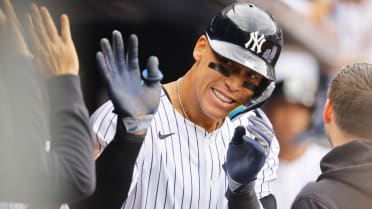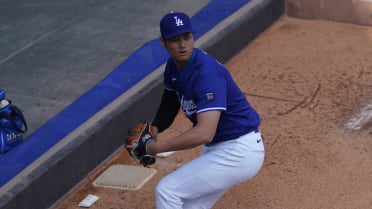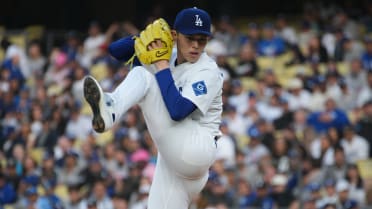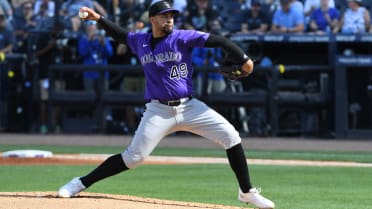Pat Murphy and I sat at his kitchen table one night in February. We talked a little about baseball and a lot about life, which is common in conversations with the 2024 National League Manager of the Year.
Murphy had welcomed our MLB Network feature crew into his world for a day, amid preparations for his second season as the Brewers’ manager. We rode in Murphy’s SUV to a Spring Training game. We interviewed his 10-year-old son, Austin, as the Brewers and Giants played in Scottsdale. We visited the family’s Phoenix-area home to observe the weekly Wiffle ball game -- equal parts carefree and competitive -- that Murphy organizes for his sons and their friends.
As the hours and stories rolled by, I felt the burden of realizing how much of Murph’s storytelling wouldn’t make the final cut for the feature story that airs Wednesday as part of our Opening Day coverage.
And that was before Murphy started telling me about his friend, Muhammad Ali.
Yes. His friend Muhammad Ali.
As is typical of a Murphy story, the Ali anecdote includes entries from different chapters of his life and reflects perspective he’s gained over the years.
Murphy met Ali for the first time at a banquet in 1992, during his tenure as the head baseball coach at Notre Dame. Ali lived near South Bend in Berrien Springs, Mich. Joe Kernan, the former South Bend mayor, Indiana governor and Notre Dame baseball alum, knew of Murphy’s passion for boxing and arranged for him to sit near "The Greatest."
Long after Murphy left South Bend to preside over a powerhouse program at Arizona State, one of his former assistant coaches reached out. A high school ballplayer in Niles, Mich., was looking to get in touch with college coaches. He wasn’t a candidate for ASU. He just wanted an opportunity somewhere.
Murphy loves calls like that. If you’re hungry, he has time for you. Murphy checked with his contacts at junior colleges and found a roster spot. Word got back to Niles that Murphy -- a single father with a frenetic schedule and generous heart -- had taken the time to help.
Unbeknownst to Murphy, the young man was a friend and baseball teammate of Asaad Ali at Niles High School.
Yes, Asaad is the son of Muhammad and Lonnie Ali.
“Lonnie got the word that I went out of my way to help this kid, with no [agenda], and it worked out for the kid,” Murphy told me. “He played and did really well, signed a pro contract.
“Lonnie calls this coach and says, ‘I want to meet this guy.’”
Lonnie had no way of knowing that “this guy” -- Murphy -- was a longtime boxer who revered her husband and had a portrait of Ali in his living room. As it turned out, Muhammad and Lonnie also had a home in the Phoenix area, not far from Murphy.
“Lonnie reaches out to me, comes to my house, and sees The Champ up there,” Murphy recalled. “She knows I had no idea she was going to come into my life. She’s like, ‘You’ve got to meet The Champ.’”
And that’s how Murphy and his oldest son Kai -- now a San Diego Padres minor league outfielder -- wound up having dinner at the Ali household.
“Talk about fortunate,” Murphy said. “We looked through books together, pictures of him. It was priceless. I just always respected that he wasn’t afraid to go against the grain, wasn’t afraid to be himself.”
By then, Parkinson’s disease had made it difficult for Ali to communicate. But Murphy has a vivid recollection of the initial conversation they had at the South Bend banquet in 1992.
Murphy remembers asking Ali, “Champ, why did you start bragging, talking, running your mouth, all that kind of stuff? Were you always like that?”
Murphy hushed his voice to barely more than a whisper, in telling me what happened next.
“He leaned over and he said, ‘I was scared to death.’ That’s what he said: ‘I was scared to death,' and that just came out.
“I’m like, ‘Wow.’ You’d never hear him say that. But he said that to me.”
Ask an American sports fan to name the most fearless athletes of the past 100 years, and Ali would be one of the most popular answers.
I observed to Murphy that if Ali was scared, then everyone should be afforded the grace to feel scared.
“Exactly -- because we all are,” Murphy replied. “Who are we kidding? Fear is part of it. If you learn to use it, like fire, you can do a lot of great things. If you don’t learn to use it, it can burn your house down and destroy you.
“He taught me a lot, just by that type of thing.”
Murphy’s memorable exchange with Ali occurred more than 30 years ago, at a time when Murphy -- by his own admission -- was overly obsessed with wins and losses during successful tenures at Notre Dame and Arizona State.
“People were telling me I was a great coach,” he said. “I’m here to tell you: I was not ... I was so intense. I was so driven ... It was me not understanding that intensity, or that bluntness with players, wasn’t good. I know that now ... It was tearing me up inside, because it was about me.”
In those years, the fear Murphy allowed himself to acknowledge centered on losing baseball games. His perspective is different now, thanks to years of reflection, counseling, and journaling he does at home. Murphy credits his sessions with the late Harvey A. Dorfman, a pioneer in sports psychology, for helping him “reach those spots I needed so much help with.”
I asked Murphy what still scares him now.
“A lot of things, man,” he replied. “A lot of things. I want to be here for my kids. I want my health to be good . . . I want to see them go a little further. That’s important to me.”
Murphy, 66, suffered a heart attack during a Brewers team workout in 2020; less than four years later, after the departure of close friend Craig Counsell, he was the club’s manager on Opening Day.
The series of events helps explain why Murphy has found greater contentment in his personal life — and baseball. He prioritizes time with Austin and his 5-year-old son, Jaxon. He speaks with pride about Kai, 24, who’s been working toward his degree at Arizona State even during Spring Training.
And Murphy nearly wept when I asked about his daughter, Keli, who is married to former MLB All-Star Pedro Alvarez and has two children. Murphy has a closer relationship with Keli now than while she was growing up.
Keli enrolled in college at Arizona State after Murphy was given sole custody of Kai when his son was 3 years old.
“She’s my best friend in the world,” Murphy told me. “She didn’t grow up in this life. She came to college at ASU and helped me raise Kai, because I didn’t know what I was doing.”
Now, Keli is going back to college herself to become certified as a counselor. I asked Murphy if he views that calling as Keli’s own form of coaching.
He sighed deeply.
“See, you get me choked up about that,” he said. “She’s the greatest. And I know it’s my daughter, but if you spend time with her, she gets it. She gets it, and I think this [baseball] world has helped her get it.
“Her husband being in the business, going through all he went through -- Silver Slugger and All-Star, to not as long of a [playing] career as he wanted. Learning what she’s learned from all of this, she’s so sharp.
“Yeah, she’s in coaching. And she’s great at it -- way better than I could ever dream to be, because she’s sensible, she’s levelheaded. She’s got an element of intensity but an element of grace. I’m so proud.”
When Murphy built his elaborate backyard ballpark, he gave it a poignant name: Bob Welch Field, after the Cy Young Award winner who battled addiction and died in 2014 at age 57. Murphy, whose late father dealt with alcoholism, hired Welch to work on his coaching staff at ASU.
“He was a great friend,” Murphy said. “He taught me so much about the game of baseball. He taught me about the Major League game. He taught me about coaching, about treating people [well], the lighter side. He was such a giving man ... I always want to honor him. When everybody comes over, we get to bring his name up. We’re doing it right now.
“Everybody has somebody that has addiction in their life. It’s way more serious if you don’t understand it or if you haven’t been through it. I learned a lot from him about it. It’s a horrible thing. ... My older kids knew him well and loved him. He was so good to them. He was so open with them and talked to them openly about all of it. It was a beautiful education for my kids.”
Welch’s influence helped Murphy realize that authenticity is often the best response to complexity. That lesson helps explain why Murphy, in his seventh decade of life, describes himself as a “work in progress.” Murphy knows more than he did as a young coach at Notre Dame, but he is less certain of the answers. He’s added humility without losing charisma, a combination that helps his players manage the stress of a sport centered on failure.
He wants to lead them to a World Series title. Of course he does, but Pat Murphy has realized the best way to pursue the big dream is by focusing on the smaller ones.
“This may sound crazy, but I don’t even think about [the World Series],” Murphy told me. “I really don’t. Whatever happens, happens. We’re working towards that.
“I believe 2024 reinforced things that I knew were true in the game. This is a game about people. I’m all for the analytics. I’m all for data. I want that data. I want to understand it, so I don’t make fun of it. I use it.
“But the game is played by people and always will be. The mentality of those people -- those hungry players -- made me look good for a long time.”
Jon Paul Morosi is a reporter for MLB.com and MLB Network.




